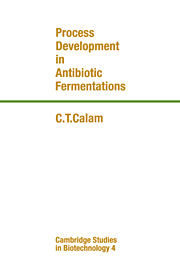Book contents
- Frontmatter
- Contents
- Preface
- Part 1 Background
- Part 2 Process development in the laboratory
- 7 Laboratory fermentation process development
- 8 Assessment and understanding of experimental results
- 9 Strain improvement
- 10 Methods for laboratory process development
- Part 3 Industrial fermentation plants and pilot plants
- Postscript
- Bibliography
- References
- Index
- Frontmatter
- Contents
- Preface
- Part 1 Background
- Part 2 Process development in the laboratory
- 7 Laboratory fermentation process development
- 8 Assessment and understanding of experimental results
- 9 Strain improvement
- 10 Methods for laboratory process development
- Part 3 Industrial fermentation plants and pilot plants
- Postscript
- Bibliography
- References
- Index
Summary
The productivity of antibiotic fermentations depends on the medium and conditions used, and also on the state of the genotype, i.e. the nucleus of the cells. Strain modification by mutation of the nucleus to give high yields has long been used and is illustrated in Fig. 3.9 in the case of oxytetracycline production. Mutation implies random modification of the nucleus. Recombination techniques and gene insertion methods can also be used to modify the nucleus in a more systematic way. Gene insertion appears to be the method of the future.
Since the use of mutation and other methods involve changes in the nucleus, strain development is often seen as a branch of genetics. There is no denying the connection, but, operationally, strain development is more akin to the long-established science of breeding, which has, over very many years, led to important improvements in plants and animals used in farming.
In strain development, the search is for new strains that (1) give better results and more product, (2) are capable of further development, i.e. have a flexible genome, and (3) are convenient in use. In breeding, the classical approach has been based on the careful choice of parental material, optimal conditions of culture for the expression of the desired effect, and detailed recording to aid selection and future planning. These points remain of maximum importance in industrial strain improvement. Selection is an important part of the system. Selection requires a great deal of work, and the choice of the correct system is of key importance.
Mutation produces both good and bad effects on the nucleus. Selection is usually only narrowly based, mainly on productivity.
- Type
- Chapter
- Information
- Process Development in Antibiotic Fermentations , pp. 104 - 117Publisher: Cambridge University PressPrint publication year: 1987



